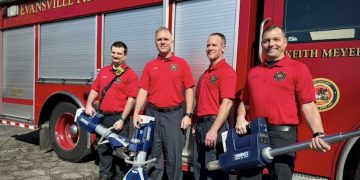Bloomington, Indiana – On June 10 this year, Bloomington’s city council decided to hire then-deputy council administrator/attorney Stephen Lucas to replace the retiring Dan Sherman. Lucas had been serving as Sherman’s deputy for about nine months.
Just after the meeting when the council voted to hire Lucas, The Square Beacon filed a request under Indiana’s Access to Public Records Act (APRA) for an email message described during the meeting by councilmember Isabel Piedmont-Smith.
The email message, from council president Steve Volan to the other eight councilmembers, was described as including the dollar figure for a proposed salary, and the logic supporting that level of compensation.
The city council provided the email to The Square Beacon, but redacted a substantial portion of it.
Responding to a formal complaint by The Square Beacon, Indiana’s public access counselor has recently issued an opinion that says, “[T]he email, if at all a factor in the decision, should be made public. This is even more so when the email was teased during a public meeting.” The email clearly factored into the council’s decision to hire Lucas at the proposed salary.
The opinion continues: “As a deliberative body, it certainly seems disingenuous to argue that documented deliberative material is off limits when those materials are referenced in a public meeting.”
The opinion also notes that the APRA provides the basis for a potential lawsuit against the city council: “There is indeed a cause of action for arbitrary or capricious exercise of discretion in withholding public records. The Council will be well served being mindful of this going forward.”
In light of the public access counselor’s opinion, the city council finally produced the un-redacted email message.
Based on the un-redacted email, among the facts that the city council tried to shield from public view was a choice not to follow the advice of the human resources department in setting a salary range. The salary range suggested by human resources, as reported by Volan’s email, looks like it was about $10,000 lower than the one used by the council.
Also shielded from public view was the council’s apparent support for the idea that the council’s administrator/attorney has more responsibility than an assistant city attorney, like Larry Allen. In late September, Allen argued Bloomington’s position in a case that was in front of the Indiana Court of Appeals.
Based on the un-redacted email, the city council appears to concur that its administrator/attorney has responsibilities more like city attorney Mike Rouker’s. In January, Rouker argued Bloomington’s position in front of Indiana’s Supreme Court.
Based on the un-redacted email, the city council supported counting as experience for Lucas, two and a half years worth of internship with the city of Bloomington, and his three years as chief deputy clerk for the city.
The city clerk is an elected position. Based on the un-redacted email, the city council is supportive of the idea that the clerk’s office should be seen as structurally separate from other city departments in a way that the council’s office is not. The city clerk’s lower compensation ($60,038 in 2021) is elided in the email, which describes the council’s administrator/attorney as the lowest paid department head at the city “except the clerk, who is elected and leads an independent department.”
None of this information should have been shielded from public view. This information should have formed the basis for public deliberations by the city council about appropriate compensation.
Given the city council’s decision not to conduct a search for the position, public deliberations on compensation should have been considered as even more crucial.
It’s worth noting that the council was asked initially by council president Steve Volan to vote on hiring Lucas, without providing other councilmembers even with a salary figure, much less the logic behind that figure. Only when councilmember Matt Flaherty expressed a reluctance to vote without that information, did the council delay that vote for a week, so that Volan could provide the details.
At the meeting when the vote was taken, the salary figure was not stated aloud. The Square Beacon had to inquire with Lucas after the meeting to find out how much he would be paid.
The recent opinion from the public access counselor follows an earlier one in which he encouraged the city council to produce requested records that the council wanted to withhold.
It’s fair to say: Bloomington’s city council has a transparency problem.
Part of the problem is rooted in the city council’s basic understanding of Indiana’s Access to Public Records Act.
It’s a piece of legislation that is not meant to be used as a shield—a list of exceptions that can be wielded by governing bodies to prevent disclosure of information they want to keep secret.
Instead, it is supposed to be used as a sword, at which tip public bodies can be compelled to surrender information to the actual owners of that information, namely the public.
The idea that the APRA should be conceived as a shield is reflected in an email sent to councilmembers by their now retired administrator/attorney Dan Sherman in the early days of the pandemic.
Sherman wrote to councilmembers:
“If you would rather feel free to expound without fear of creating a disclosable public record, your speculative communications within the City may well be withheld as deliberative material. Although no guarantee that your words won’t be disclosed, you may want to include “deliberative” in the heading, so that your attorneys will know what you intended in that regard”
Sherman’s advice relies on using the so-called “deliberative” exemption in the APRA as a shield. It’s the same exemption that the public access counselor critiqued in his latest opinion: “The arguments presented by the Council would be more appropriately applied to internal discussions of an agency rather than a governing body.”
The current city council policy on applying discretionary exemptions to APRA requests appears to be: Use all exemptions in the APRA to prevent as much information as possible from being disclosed. That’s the opposite of being as transparent as possible. That’s a policy that says: Be as opaque as legally possible.
Certainly some information should not be disclosed, like medical records or social security numbers. There are laws against disclosing information like that.
There’s still a way to respond to requests under the APRA that makes the city council’s records as transparent as possible.
Bloomington’s city council should adopt a formal policy that says:
“All information requested under the Access to Public Records Act will be produced without redaction by the city council except for information prohibited by law from disclosure”.
Enacting such a policy could be a goal for 2021.




















































































